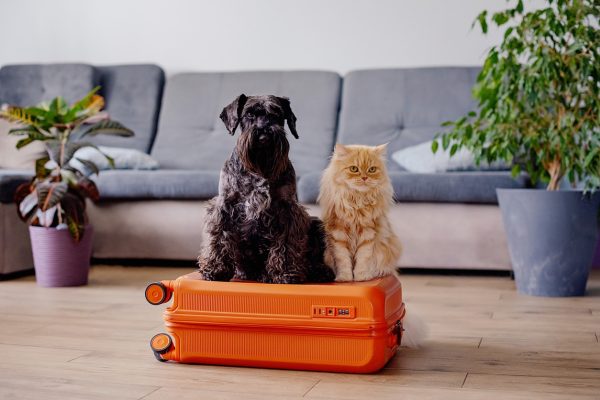- Not a substitute for professional veterinary help.
Finding last-minute care for a pet isn’t always easy.
Family, friends, and pet sitters might not be available at short notice, and traditional boarding facilities may be fully booked. You can sometimes find an emergency pet sitter through services like Rover, but this can depend on your area and circumstances.
During a natural disaster or other city-wide emergency, you might have a tough time finding anyone available. And of course, if you have to handle a family crisis or head to the hospital, you may not have much time to make arrangements.
Searching for pet sitting or emergency dog boarding can add stress to your situation, but you have options for finding fast, reliable care. We’ve done the research and come up with a list of emergency boarding options, starting with the most accessible in a pinch.
Rover for Emergency Dog Boarding or House Sitting
Best for: Most emergency situations where you need a sitter on short notice. especially if you already have a relationship with a sitter.
Whether you’re short on time due to a medical emergency, travel delay, or anything elseRover can connect you with local sitters who offer in-home dog boarding.
The mobile app and website make it easy to search for someone near you, message multiple sitters, and book quickly. Sometimes this is much easier than trying to track down a friend or get in touch with a boarding facility at the last minute.
If you’ve previously worked with a sitter on Rover, you may feel more secure leaving your pet with someone who knows them—offering you some peace of mind in an emergency situation.
Plus, some sitters prioritize clients they already have a relationship with, so you might spend less time trying to find a sitter.
Dog Kennels and Traditional Boarding
Best for: Planned events. May have less availability for urgent, last-minute needs.
While many dog boarding facilities offer great care, they often require plenty of advanced notice, vaccination records and gear, and a scheduled intake process.
If you’re short on time due to an emergency, you may not have much time to gather the required documents and items for your pup, even if you can find a boarding facility with space. Some facilities do offer emergency boarding, but they may not always have availability when you need them.
That said, dog boarding can work great for planned events, like childbirth or another hospital stay. This allows you to gather the documents and take care of your pet’s intake ahead of time.
Family, Friends, or Neighbors
Best for: Short-term emergencies when you need immediate help nearby.
Turning to a loved one or neighbor can be the quickest option, especially if you need to leave in the middle of the night or without much warning.
This option may work for some quick coverage while you figure out a longer-term solution, especially for family emergencies or illness.
However, this type of arrangement may not work as well in other situations. During a natural disaster, for instance, your friends, family, and especially neighbors in the same area will likely have just as much difficulty caring for your pet.
Your Dog Trainer
Best for: Dogs who already have a working relationship with a trainer.
If your dog has worked with a trainer—especially one who offers boarding or daycare services—they may be able to help you out in emergency.
You’ll want to ask them about this possibility ahead of time, of course. But if you already have a good working relationship, you can always ask whether they’d consider taking care of your pup if an emergency comes up.
You may want to save this option if you truly have no one else to ask, since your relationship with your trainer is a professional one.
Pet Shelters and Rescue Groups
Best for: True crisis situations with no other options available.
Some municipal and nonprofit animal shelters have temporary boarding or emergency intake programs, particularly during natural disasters.
Keep in mind, though, that they will generally have very limited space, and pets may have to stay in stressful or crowded conditions. They may also face exposure to illness, risk of injury from other dogs in the same situation, and a great deal of stress while boarding.
This should be your last resort, used only when you have no other options for boarding your pet. Before relying on a shelter, contact them directly to learn about their emergency policies.
How Much Does Emergency Dog Boarding Cost?
When reaching out to your local community on social media or forums, you’ll also want to offer payment for taking care of your pet.
Payment helps ensure the person caring for your pet will prioritize their care. Friends and family may wave off your offer of payment, but it’s still best to offer.
The cost of dog boarding, on average, falls between $40-$50 a night. The cost will depend on your location, the type of boarding you choose, and any additional charges for last-minute help.
Preparing for Emergency Dog Boarding
Whether you’re planning ahead or navigating an emergency in real time, having key information and your pet’s essentials ready can make it easier to find care.
Here’s how to prepare:
- Leave a key for your caretaker: If you leave a key, you can head out before they arrive, which can make a big difference if you have to get to a hospital or catch a plane!
- Have your paperwork ready: Most boarding options (even friends or family) need vaccination records, vet contact information, feeding and walking instructions, and other care directions.
- Create a dog “go bag”: Make sure to gather everything your dog will need. Essentials include food and treats, their leash and collar, medication, ID and rabies tags, favorite toys, and a blanket or other comfort item.
- Give a timeline: Offering an estimated timeline for the length of time you’ll be away can help your sitter or boarder commit to saying yes.
- Have another backup: Having a second option ready to go can save you time if your first choice doesn’t work out or you need additional pet care past your estimated timeline.
Another important step to prepare: Plan ahead!
If you have a go-to sitter, trainer, or boarding facility, talk to them before an emergency happens. Finding out their policies and availability before an emergency strikes can save you time and help you secure a spot when you need it.





